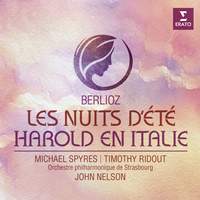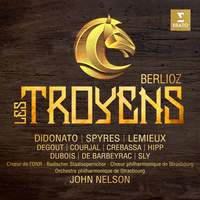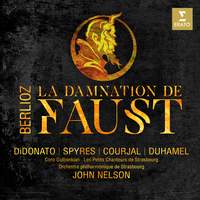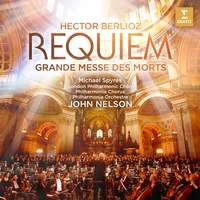Interview,
John Nelson on Berlioz and Handel
 The veteran American conductor John Nelson's love-affair with the music of Hector Berlioz stretches back more than fifty years, and continues to bear fruit this week with a wonderful live recording of the song-cycle Les nuits d'été (with soloist Michael Spyres tackling all of the songs in their original orchestral keys) and Harold en Italie, both captured in concert in Strasbourg last autumn. Next week he visits the UK (again with Spyres in tow!) to conduct Handel's Messiah with The English Concert at Coventry Cathedral, in a performance that will be live-streamed on medici.tv and released on Warner Classics next year...
The veteran American conductor John Nelson's love-affair with the music of Hector Berlioz stretches back more than fifty years, and continues to bear fruit this week with a wonderful live recording of the song-cycle Les nuits d'été (with soloist Michael Spyres tackling all of the songs in their original orchestral keys) and Harold en Italie, both captured in concert in Strasbourg last autumn. Next week he visits the UK (again with Spyres in tow!) to conduct Handel's Messiah with The English Concert at Coventry Cathedral, in a performance that will be live-streamed on medici.tv and released on Warner Classics next year...
Amid preparations to fly over to the UK, John was kind enough to answer some quick questions via email about his long-standing relationship with Berlioz's music, some of the decisions he's taken on the new recording, his very comprehensive approach to Messiah, and why Coventry Cathedral holds a special personal significance for him...
Berlioz’s music has occupied such an important place in your repertoire for more than half a century now – how did that relationship begin, and do you feel that attitudes to the composer have shifted since you conducted your first Troyens in the early 1970s?
My first encounter with Berlioz came after four years of studying with Jean Morel, my French conducting teacher at Juilliard, who never mentioned Berlioz. Back then the only music people knew of this eccentric composer was his Symphonie Fantastique. It was Matthew Epstein who told me to go to the library and check out the new Barenreiter score of Les Troyens. The result of that stunning encounter was that he and I combined to organise and perform the American premiere at Carnegie Hall before a sold out, ecstatic audience. Harold Schoenberg’s review in The New York Times was equally ecstatic.
Yes, the attitudes certainly have changed. Fifty years has seen all his works become standard repertoire. Even the five-hour Les Troyens is now performed regularly in all the world’s major houses. The Strasbourg performance was my sixth production.
Michael Spyres has featured in several of your recent Berlioz projects, including that glorious 2017 recording of Les Troyens – how did the two of you meet, and what special qualities do you feel he brings to this composer’s music?
Michael is a vocal wonder. Blessed with one of the most beautiful voices on the planet, he is also blessed with extraordinary intelligence, dramatic savvy and a gift for languages. No one would know that he is not French when singing Bizet or German when singing Wagner. Our first meeting I believe was at that 2017 recording.
Although it’s now standard practice for the cycle to be performed by a single singer, it’s rather less usual for a soloist to perform all of the songs in their original keys as Michael does here: did that decision make a difference to your approach to tempi/balance etc?
I don’t think any one person has ever sung all six movements in the original keys. Our decision to do this did not affect our choice of tempi and balance: Berlioz is very precise with dynamics and tempo markings and I’m determined to observe them, especially in recordings.
The opening 'Villanelle' is taken at a much steadier tempo here than I’m used to hearing – and it works so beautifully! What was the thought-process behind that?
Berlioz wrote ALLEGRETTO, quarter note = 96. Most of the time conductors prefer Allegro at 120. But this is about two lovers calmly walking in the woods, not running!
Did you deliberately bide your time before recording Harold en Italie, or was it simply a case of the stars not aligning until now?
The stars aligned! I first approached Pinky Zuckerman then Renaud Capuçon, but both declined – fortunately because we found the brilliant young Tim Ridout who delivered an unparalleled performance. One for the ages!
Harold was of course instigated by a request from Paganini, who famously rescinded his interest after seeing an early sketch of one movement – do you sympathise with his misgivings about the work, and do you think the finished score was nonetheless influenced by his artistic personality?
I do not for a minute sympathize with his misgivings but I can understand his reluctance. There was just not enough showy stuff for the virtuosic soloist. No, I don’t think there is any sign of Paganini’s influence.
You’re scheduled to conduct several performances of Bizet’s Carmen next year, which will see Joyce DiDonato and Michael reuniting after Les Troyens and La damnation de Faust – do you see any kinship between this most popular of French operas and Berlioz’s masterpiece, or do they occupy completely different spaces?
I failed to see any kinship, except in their being French with that wonderful sense of color.
Looking to the immediate future, you’ll be conducting Handel’s Messiah just down the road from us at Coventry Cathedral next week – does this venue have a special significance for you (and for this piece?), and what can you tell us about the version of the score we’re going to hear?
Coventry has very special significance for me because of Benjamin Britten’s War Requiem being premiered there and my listening to it on the day John Kennedy died (1963). Unforgettable and deeply moving. In the remains of the original Cathedral just outside the new one there is a sign at the altar: 'Father Forgive' That is the essence of the Christian faith which I espouse and will inspire me as I conduct 'Surely He hath borne our griefs' and 'With His stripes we are healed'.
I’ll be recording not just one version of Messiah, but all seven versions he wrote in his lifetime. I believe this will be the first time in history that this will have been done. How amazing and wonderful is that?
John Nelson will conduct Handel’s Messiah with The English Concert at Coventry Cathedral next Thursday; the performance will be live-streamed on medici.tv and an audio recording released by Warner Classics next year.
Michael Spyres (baritenor), Timothy Ridout (viola), Orchestre philharmonique de Strasbourg, John Nelson
Available Formats: CD, MP3, FLAC, Hi-Res FLAC
Joyce DiDonato (Didon), Michael Spyres (Énée), Marie-Nicole Lemieux (Cassandre), Stéphane Degout (Chorèbe)
Orchestre et Choeur philharmonique de Strasbourg, Badischer Staatsopernchor, Choeur de l’Opéra du Rhin, John Nelson
Available Formats: MP3, FLAC, Hi-Res FLAC
Michael Spyres (Faust), Joyce DiDonato (Marguerite), Nicolas Courjal (Méphistophélès), Alexandre Duhamel (Brander)
Orchestre philharmonique de Strasbourg, Coro Gulbenkian, John Nelson
Available Formats: 2 CDs + DVD Video, MP3, FLAC, Hi-Res FLAC
Michael Spyres (tenor), Philharmonia Orchestra, London Philharmonic Choir, Philharmonia Chorus, John Nelson
Available Formats: MP3, FLAC, Hi-Res FLAC






